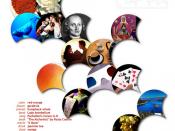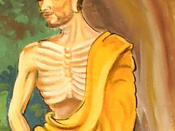In Herman Hesse's Siddhartha, unity and reoccurrence are reflecting themes in this novel and in life. Unity is "the state of being one or a unit; harmony, agreement in feelings or ideas or aims, etc" and reoccurrence is "a fresh embodiment." Both unity and reoccurrence are first introduced by means of the river and by the mystical word "Om." Direct commentary from Siddhartha and the narrator also introduces these themes. Unity is not a part of Buddhism but is very prevalent in Hinduism and Christianity. In addition, reoccurrence finds its roots in Hinduism.
Frequent allusions to the river correspond w/ Siddhartha's infinite thoughts of Unity and his initial plans to strive for it. Siddhartha has a number of specific goals during the course of this novel, but in no way does this detract from the bare nature of his ultimate goal. The accomplishment of specific goals was an important part of the progression approaching his absolute state of Unity.
"I sat here and listened to the river. It has told me a great deal, it has filled me with many great thoughts, with thoughts of unity." (Pg. 114)
Siddhartha see things united and somehow entangled in a seemingly endless and meaningless circular chain of events. Allusions frequently show Siddhartha's conditions by means of clever imagery suggesting circular motion and an immobile state. "Yes, that was how it was. Everything that was not suffered to the end and finally concluded recurred, and the same sorrows were undergone." Siddhartha is first compared to a potter's wheel that slowly revolves and comes to a stop. From here, Siddhartha meets the wise Vasudeva, learns more from him, and from Siddhartha's own experiences, gains more wisdom. "It was nothing but a preparation of the soul, a capacity, a secret art of...


